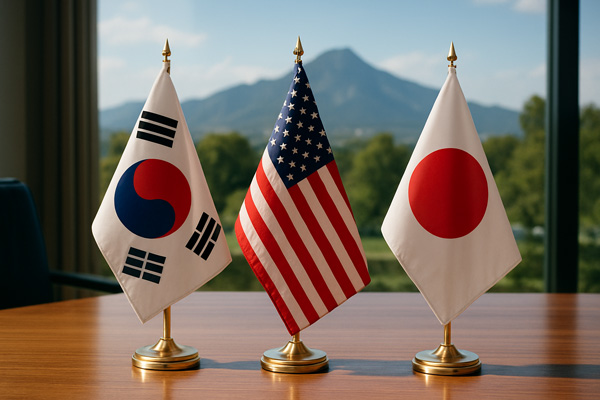Modi, Xi, and Putin present rare display of unity at SCO summit

[Flags of India, China, and Russia displayed at a table. Image generated by ChatGPT]
India’s Prime Minister Narendra Modi joined Chinese leader Xi Jinping and Russian President Vladimir Putin at the Shanghai Cooperation Organization (SCO) summit in Tianjin on August 25, presenting a rare public show of unity among three nations currently in tension with the United States.
Their brief yet highly symbolic gesture of hand-holding and cordial exchanges during the event appeared carefully orchestrated to counterbalance U.S. leadership on the global stage.
Modi arrived in China for his first visit in seven years, walking hand-in-hand with Putin into a hall where Xi stood waiting to greet them.
The trio shared smiles and light conversation before interpreters joined in.
After the group photograph, Modi once again clasped hands with both leaders, displaying the image of cooperation.
China, India, and Russia used the meeting to present themselves as reliable alternatives to the Western-led global order.
Xi urged member states at the summit to “seek integration, not decoupling,” without directly naming the United States.
Twenty leaders, including from Iran, Kazakhstan, and Belarus, attended the event, which also promoted China’s call for a multipolar world.
The SCO summit reflected China’s efforts to promote its foreign policy agenda, particularly as U.S. trade actions continue to strain relations with participating countries.
Modi’s appearance came just weeks after the Trump administration imposed steep 50 percent tariffs on Indian exports as part of sanctions tied to India’s continued energy ties with Russia.
The move pushed New Delhi to reconsider its global alliances, prompting closer engagement with China and Russia at the SCO summit.
At the summit, Xi met with Modi privately and scheduled a one-on-one meeting with Putin for the following day.
He also pitched the creation of an SCO development bank and announced China would inject $1.4 billion into development projects within member states over the next three years.
Despite the outward show of cooperation, serious geopolitical differences persist among SCO members.
China and India continue to navigate their unresolved border dispute, which turned deadly in 2020.
Relations eased after the October 2024 summit in Kazan, when both countries agreed on partial patrol measures and pledged to prevent further clashes.
The SCO, originally founded by China and Russia in 2001, has expanded its scope beyond Central Asian security concerns to include economic and diplomatic initiatives.
Collectively, its member states now account for about 40 percent of the global population and one-quarter of the world’s economy.
Modi’s public warmth toward Xi and Putin came shortly after U.S. officials made pointed remarks about India’s relationship with Moscow.
Trump’s trade adviser recently labeled India “a massive refining hub and oil money laundromat for the Kremlin,” intensifying the diplomatic rift.
Although the summit generated few concrete agreements, analysts view the event as a powerful diplomatic performance.
Xi used the opportunity to position China as a stable alternative to U.S. unpredictability, while Modi and Putin leveraged the optics to counter narratives of isolation.

- Seokin Joung (Chris) / Grade 11
- St. Johnsbury Academy in Jeju

![THE HERALD STUDENT REPORTERS [US]](/assets/images/logo_student_us.png)
![THE HERALD STUDENT REPORTERS [Canada]](/assets/images/logo_student_ca.png)
